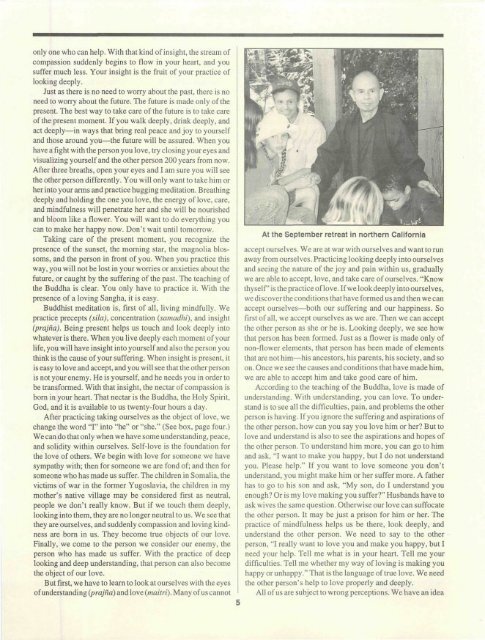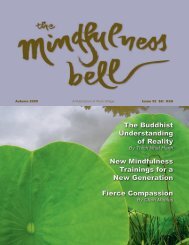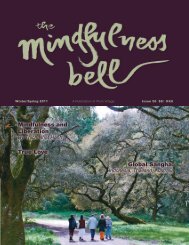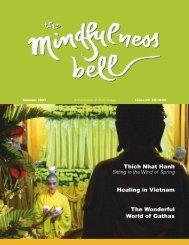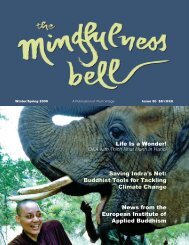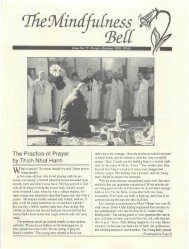J 'Bell - The Mindfulness Bell
J 'Bell - The Mindfulness Bell
J 'Bell - The Mindfulness Bell
Create successful ePaper yourself
Turn your PDF publications into a flip-book with our unique Google optimized e-Paper software.
only one who can help. With thatkindof insight, the stream of<br />
compassion suddenly begins to flow in your heart, and you<br />
suffer much less. Your insight is the fruit of your practice of<br />
looking deeply.<br />
Just as there is noneed to worry about thepast, there is no<br />
needto worry about the future. <strong>The</strong> future is made only of the<br />
present. <strong>The</strong> best way to take care of the future istotake care<br />
of the present moment. If you walk deeply, drink deeply, and<br />
act deeply—in ways that bring real peace and joy to yourself<br />
and those around you—the future will be assured. When you<br />
have a fightwith the person youlove, try closing your eyes and<br />
visualizing yourself and the other person 200 yearsfrom now.<br />
After three breaths,open your eyes and I am sureyou will see<br />
the other persondifferently. You willonly want to take him or<br />
her into your arms and practice hugging meditation. Breathing<br />
deeply and holding the one you love,theenergy of love, care,<br />
and mindfulness will penetrate her and she will be nourished<br />
and bloom like a flower. You will want to do everything you<br />
can to make her happy now. Don't wait until tomorrow.<br />
Taking care of the present moment, you recognize the<br />
presence of the sunset, the morning star, the magnolia blossoms,<br />
and the person in front of you. When you practice this<br />
way, you willnot be lost in your worries or anxieties about the<br />
future, or caught by the suffering of the past. <strong>The</strong> teachingof<br />
the Buddha is clear. You only have to practice it. With the<br />
presence of a loving Sangha, it is easy.<br />
Buddhist meditation is, first of all, living mindfully. We<br />
practice precepts (sila), concentration (samadhi), and insight<br />
(prajna). Being present helps us touch and look deeply into<br />
whatever is there. When youlivedeeply each momentof your<br />
life, you will have insight into yourself and also the person you<br />
thinkis the causeof your suffering. When insight is present,it<br />
is easy to love and accept, and you will see that the other person<br />
is not your enemy. He is yourself,andheneedsyouin order to<br />
be transformed. With that insight, the nectarof compassion is<br />
born in your heart. That nectar isthe Buddha, theHoly Spirit,<br />
God, and it is available to us twenty-four hours a day.<br />
After practicing taking ourselves as the object of love,we<br />
change the word "I" into "he"or "she." (See box, page four.)<br />
We can do that only whenwe have some understanding, peace,<br />
and solidity within ourselves. Self-love is the foundation for<br />
the love of others. We begin with love for someone we have<br />
sympathy with; then for someone weare fond of; and then for<br />
someone who has made us suffer. <strong>The</strong> children in Somalia, the<br />
victims of war in the former Yugoslavia, the children in my<br />
mother's native village may be considered first as neutral,<br />
people we don't really know. But if we touch them deeply,<br />
looking into them, they are no longer neutral to us. We see that<br />
theyare ourselves,and suddenly compassion and lovingkindness<br />
are born in us. <strong>The</strong>y become true objects of our love.<br />
Finally, we come to the person we consider our enemy, the<br />
person who has made us suffer. With the practice of deep<br />
looking and deep understanding, that person can also become<br />
the object of our love.<br />
But first, we have to learn to look at ourselves with the eyes<br />
of understanding (prajna) and love (maitri). Many of us cannot<br />
At theSeptember retreat in northern California<br />
acceptourselves. We are at war with ourselvesand want to run<br />
awayfrom ourselves. Practicing looking deeply intoourselves<br />
and seeing the nature of the joy and pain within us, gradually<br />
we are able to accept, love,and take care of ourselves. "Know<br />
thyself is the practice of love. If we look deeply into ourselves,<br />
we discover the conditions that have formed us and then we can<br />
accept ourselves—both our suffering and our happiness. So<br />
first of all, we accept ourselves aswe are. <strong>The</strong>n we can accept<br />
the other person as she or he is. Looking deeply, we see how<br />
that person has been formed. Just as a flower is made only of<br />
non-flower elements, that person has been made of elements<br />
that are not him—his ancestors, his parents, his society, andso<br />
on. Once we see the causes and conditionsthat have made him,<br />
we are able to accept him and take good care of him.<br />
According to the teaching of the Buddha, love is made of<br />
understanding. With understanding, you can love. To understand<br />
isto seeall the difficulties, pain,and problems the other<br />
person is having. Ifyou ignore the suffering and aspirationsof<br />
the other person,howcan you say you lovehim or her? Butto<br />
loveand understand is alsotosee the aspirations and hopesof<br />
theother person. To understand him more, you can go tohim<br />
and ask, "I want to make you happy, but I do not understand<br />
you. Please help." If you want to love someone you don't<br />
understand, you might make him or her suffer more. A father<br />
has to go to his son and ask, "My son, do I understand you<br />
enough?Or is my love making you suffer?" Husbands haveto<br />
ask wives the same question. Otherwise our love can suffocate<br />
the other person. It may be just a prison for him or her. <strong>The</strong><br />
practice of mindfulness helps us be there, look deeply, and<br />
understand the other person. We need to say to the other<br />
person, "I really want to love you and make you happy, but I<br />
need your help. Tell me what is in your heart. Tell me your<br />
difficulties. Tell me whether my way of loving is making you<br />
happyor unhappy." Thatis the language of true love. We need<br />
the other person's help to love properly and deeply.<br />
Allof us are subject to wrong perceptions. We havean idea


